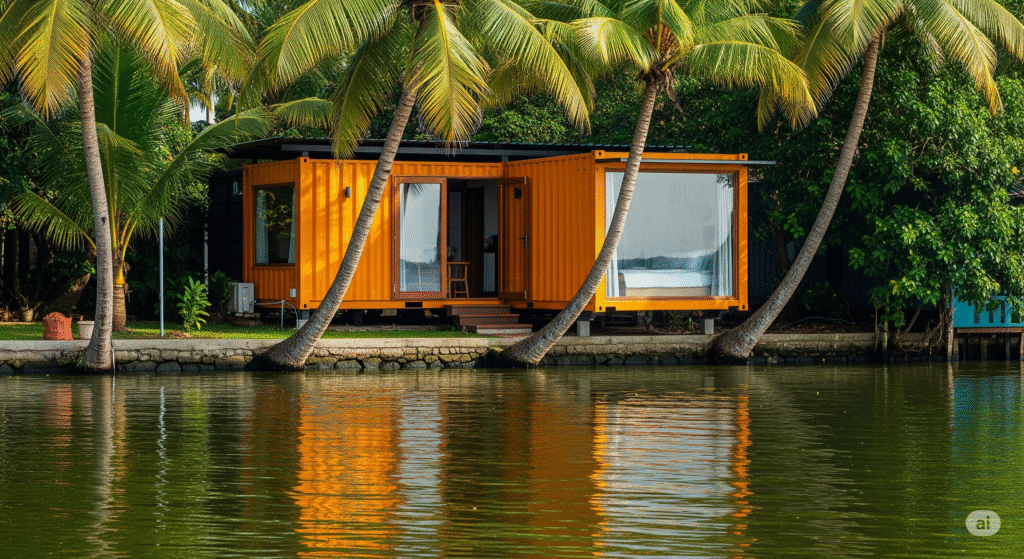Building a container home in the beautiful landscapes of Kerala is an increasingly popular and sustainable housing solution. However, understanding the legalities of this non-traditional construction method is crucial for a smooth and lawful building process. As there are no specific regulations catering exclusively to container homes in India, they fall under the purview of the same building rules and codes applicable to conventional structures.
We have already discussed about things to take care when building a container home in Kerala. This guide outlines the essential legal procedures and compliances required to build a container home in Kerala, ensuring your dream home becomes a reality without any legal hurdles.
Table of Contents
Key Regulatory Frameworks for a Container Home in Kerala
The construction of any residential building in Kerala is primarily governed by two main sets of regulations, depending on the location of your property:
- The Kerala Municipality Building Rules (KMBR), 2019: Applicable to areas falling under municipal corporations and municipalities.
- The Kerala Panchayat Building Rules (KPBR), 2019: Applicable to areas under the jurisdiction of Grama Panchayats.
In addition to these, the National Building Code of India (NBC) provides a comprehensive set of guidelines for safe and structurally sound construction, which should also be considered, especially for aspects not explicitly detailed in the state-level rules.
Essential Legal Procedures and Compliances
Here is a step-by-step guide to the legal requirements for constructing a container home in Kerala:
1. Land and Title Verification
Before commencing any design or construction work, ensure that you have clear and undisputed ownership of the land. The following documents are essential:
- Title Deed: Proof of ownership of the land.
- Possession Certificate: A document issued by the village office confirming your possession of the property.
- Land Tax Receipt: The latest receipt for the payment of land tax.
Furthermore, verify the zoning of the land with the local town planning department to ensure that it is designated for residential use.
2. Obtaining a Building Permit for a Container Home in Kerala
A building permit from the concerned local self-government institution (Municipality or Panchayat) is mandatory before starting any construction. The application process typically involves the following:
- Engaging a Licensed Professional: You must hire a licensed architect, engineer, or building supervisor registered with the respective local body to prepare and submit the building plans.
- Preparation of Building Plans: The plans must be drawn in accordance with the KMBR or KPBR and should include:
- Site Plan: Showing the plot boundaries, access roads, and the proposed location of the container home on the site.
- Floor Plans: Detailed drawings of the layout, including room dimensions, placement of doors and windows, and proposed furniture arrangements.
- Elevations and Sections: Exterior views and cross-sectional drawings of the structure.
- Service Plans: Details of electrical wiring, plumbing, and sanitation (including the design of the septic tank and soak pit).
- Structural Stability Certificate: This is a crucial document for container homes. A qualified structural engineer must certify that the container’s structural integrity is sound, especially after modifications like cutting openings for doors and windows. The certificate should also detail the proposed foundation and reinforcement measures.
- Submission of Application: The application for the building permit, along with all the necessary documents and fees, must be submitted to the local self-government office. Kerala has an online portal called “Sanketham” for submitting and tracking building permit applications.
3. Compliance with Building Rules of Container Home in Kerala
Your container home design must adhere to the specific provisions of the KMBR or KPBR, which include regulations regarding:
- Setbacks: Minimum distance to be maintained from the plot boundaries and the center of the road.
- Floor Area Ratio (FAR) and Coverage: The total built-up area and the percentage of the plot covered by the building must be within the permissible limits for the specific zone.
- Ventilation: All habitable rooms must have adequate ventilation through windows or other openings.
- Height Restrictions: The total height of the building must not exceed the prescribed limits.
4. During and After Construction of a Container Home in Kerala
- Inspections: The local self-government body has the authority to conduct inspections at various stages of construction to ensure compliance with the approved plans.
- Completion Certificate: Upon completion of the construction as per the permit, you must apply for a Completion Certificate from the local authority. This will be issued after a final inspection.
- Occupancy Certificate: Once the Completion Certificate is issued, you can apply for an Occupancy Certificate, which legally permits you to reside in the house.
- Utility Connections: You will need to apply separately to the Kerala State Electricity Board (KSEB) for an electricity connection and to the Kerala Water Authority (KWA) for a water connection.
Special Considerations for a Container Home in Kerala
While the legal framework is the same, container homes present some unique challenges and considerations that need to be addressed:
- Foundation: A proper foundation is critical for the stability of the container. The design of the foundation must be approved by a structural engineer.
- Insulation and Weatherproofing: Kerala’s hot and humid climate necessitates proper insulation of the container walls and roof to maintain a comfortable indoor temperature and prevent condensation.
- Earthing and Lightning Protection: Being metal structures, container homes require robust earthing and lightning protection systems for safety.
More points on this are discussed in detail in one of my previous article. As a content writer and copywriter in Kochi, I have made sure to touch topics of various fields of life with major focus on marketing.
Building a container home in Kerala is a feasible and innovative housing option. By diligently following the established legal procedures and ensuring compliance with the state’s building rules, you can turn your vision of a unique and sustainable home into a tangible and legally sound reality. It is highly recommended to work with experienced professionals who are well-versed in the local regulations to navigate the process effectively.


Pingback: Building Container Homes in Kerala: A Step-by-Step Guide